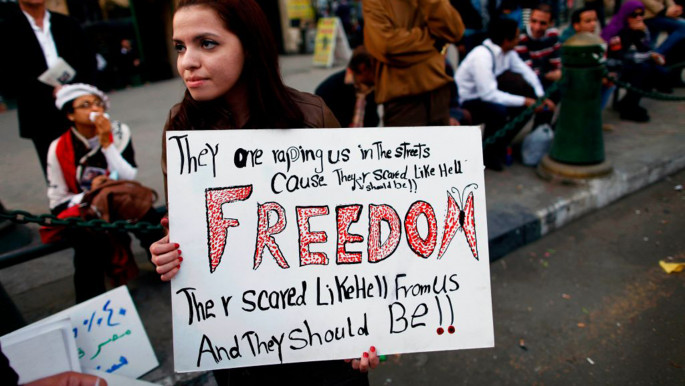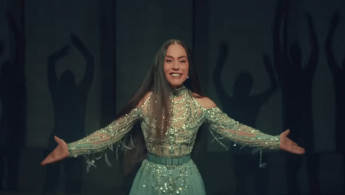This year Sherihan reminds us why she remains a Ramadan icon across the Arab world
There have been only a few performers who have been able unite the Middle East in an all-encompassing love – icons like Um Kalthoum, Abdel Haleem Hafiz, Sou'ad Hosni, and Fairouz – and Sherihan is one of them.
After a 19-year absence from television and cinema screens, Sherihan came bursting back onto the scene this Ramadan in a spectacular mini musical for a Vodafone Egypt advertisement.
People in the Arab world took to social media to express their joy, the way you do when you meet a dear friend for the first time after many years of separation. Something about seeing Sherihan back on TV brought people back to their childhoods, reminiscing about Ramadan and how this enchanting entertainer was an emblem of the holy month.
Sherihan comes from a musical family; her brother was the famous and early departed guitarist Omar Khorshid, who she credits with helping her get her foot in the door of Egyptian cinema.
She starred in her first movie, Ketta 'ala Nar (Cat on Fire) at the age of 12 with legendary Egyptian actor Farid Shawky. Sherihan went on to act in a long list of movies and plays on stage, but it was her performances during Ramadan that she is most famous for.
 |
I grew up idolising Sherihan. I was always mesmerised by her dancing and costumes. All little girls wanted to be her |  |
Each Ramadan, from the mid 1980's to the early 1990's, Sherihan starred in a nightly quiz show called Fawazeer Ramadan (Ramadan Riddles). Each episode was centred round a riddle, with a series of acting sketches. The opening title of the show lasted for seven or eight minutes and it was this part of the show that youngsters most looked forward to.
The title sequence was always a spectacular affair involving Sherihan singing and dancing in an impressive collection of colourful, sparkly and flamboyant costumes, with a mixture of dancing styles from traditional Egyptian belly dancing, to contemporary dance, and even hip-hop! There were lots of computer effects – too many at some points – with Sherihan's bodiless head often bobbing about haphazardly on screen.
"Sherihan took over Fawazeer from Nelly, another Egyptian acress who had starred in them for years," explains Rajia Hassib, author of A Pure Heart. "When Sherihan first started, the older generation were resistant because they thought no one would match Nelly. But they eventually loved her."
 |
It wasn't just Sherihan's musical talent and charismatic personality that won hearts. Off-screen Sherihan's personal tragedies made her a resilient force that won the admiration of many |  |
It wasn't just Sherihan's musical talent and charismatic personality that won hearts. Off-screen Sherihan's personal tragedies made her a resilient force that won the admiration of many.
In the early 1990's Sherihan's career almost ended when she was involved in a car accident that fractured her spine and pelvis in several places. Doctors warned her that she might never walk again. But after a series of operations Sherihan returned for another series of Fawazeer Ramadan in 1993.
Rumours flew around that late president Hosni Mubarak and his wife Suzanne were behind the accident due to her romantic involvement with their son Alaa Mubarak, rumours that Sherihan denied.
"I grew up idolising Sherihan. I was always mesmerised by her dancing and costumes. All little girls wanted to be her," says Maha J, who grew up between Egypt and Kuwait but is now based in Seattle. "Something about her reminds us of simpler times and happy childhood memories.
Even if now we look at Fawazeer and laugh at the ridiculous visual effects and gaudy costumes, there is something familiar and nostalgic like putting on a comfortable t-shirt or listening to a favourite song again.
DJ and law student Sherine shares her memories with The New Arab, "Iftar and Fawazeer were a staple combination. I would make sure I finished all my homework before iftar so as to not spoil the immersive experience. My sister and I would compete over who learns all the words to the title sequence first."
Sherihan was forced to take a career break again in 2002 when she was diagnosed with cancer of the salivary glands and had to undergo gruelling surgery. And in 2011 it was reported that following her participation in demonstrations during the Arab Spring, state authorities were harassing her, forcing her to keep a low profile.
"She was an icon," says Dr Shahd Al Shammari, an academic and author in Kuwait. "It was her dancing, bravery, and courage for me. When her back broke, that was a popular story. I was about 10-years-old. She was painted by all the women around me as super strong."
 |
| Read more: Ramadan TV show sparks #MeToo solidarity, conservative backlash in Egypt with 'shocking' rape scene |
As well as being a Ramadan icon and a figure of strength for women, Sherihan is also an icon for the Arab queer community.
Writer and author of Guapa, Saleem Haddad tells The New Arab, "There was something incredibly queer in her persona. Especially her Ramadan specials – she had an irreverence and an extravagant and camp style that really spoke to me as a young queer person in the region.
"It was funny as well because she was also looked down upon, at least in conservative segments of Jordan, because she was seen as just a dancer. It was sometimes an insult to refer to someone as Sherihan. But I think that's why I loved her, she embraced this extravagance and cosmopolitanism that I gravitated to."
It is Sherihan's bravery, resilience, and extravagance that are all embodied in her latest performance for Vodafone Egypt's Ramadan advertisement.
In a breathtaking performance lasting four minutes, we are taken on an emotional ride through Sherihan's career with all the pomp and glamour of a Broadway dance number that then transitions into a melodic contemporary dance performance before ending on a high.
With the help of her backing dancers, Sherihan acts out her career beginnings with all its promise, which then grinds to a halt after her car accident and spinal surgery, but ultimately we see her bounce back stronger than ever, with the message that despite life's attempts at breaking her, she never gave in – computer effects included.
Yousra Samir Imran is a British Egyptian writer and author who is based Yorkshire. She is the author of Hijab and Red Lipstick, being published by Hashtag Press in the UK in October 2020.
Follow her on Twitter: @UNDERYOURABAYA



